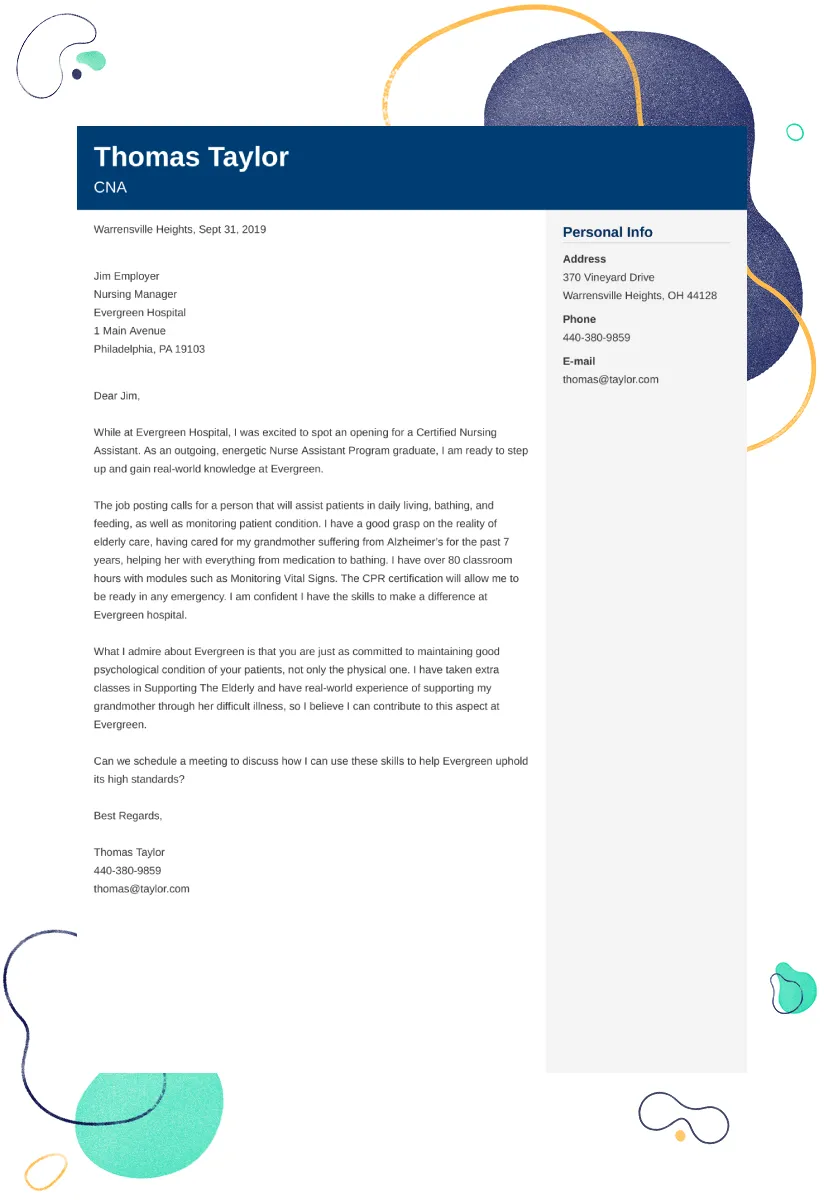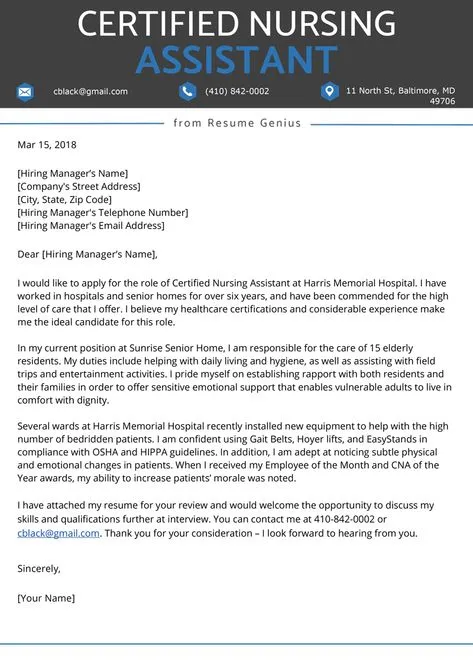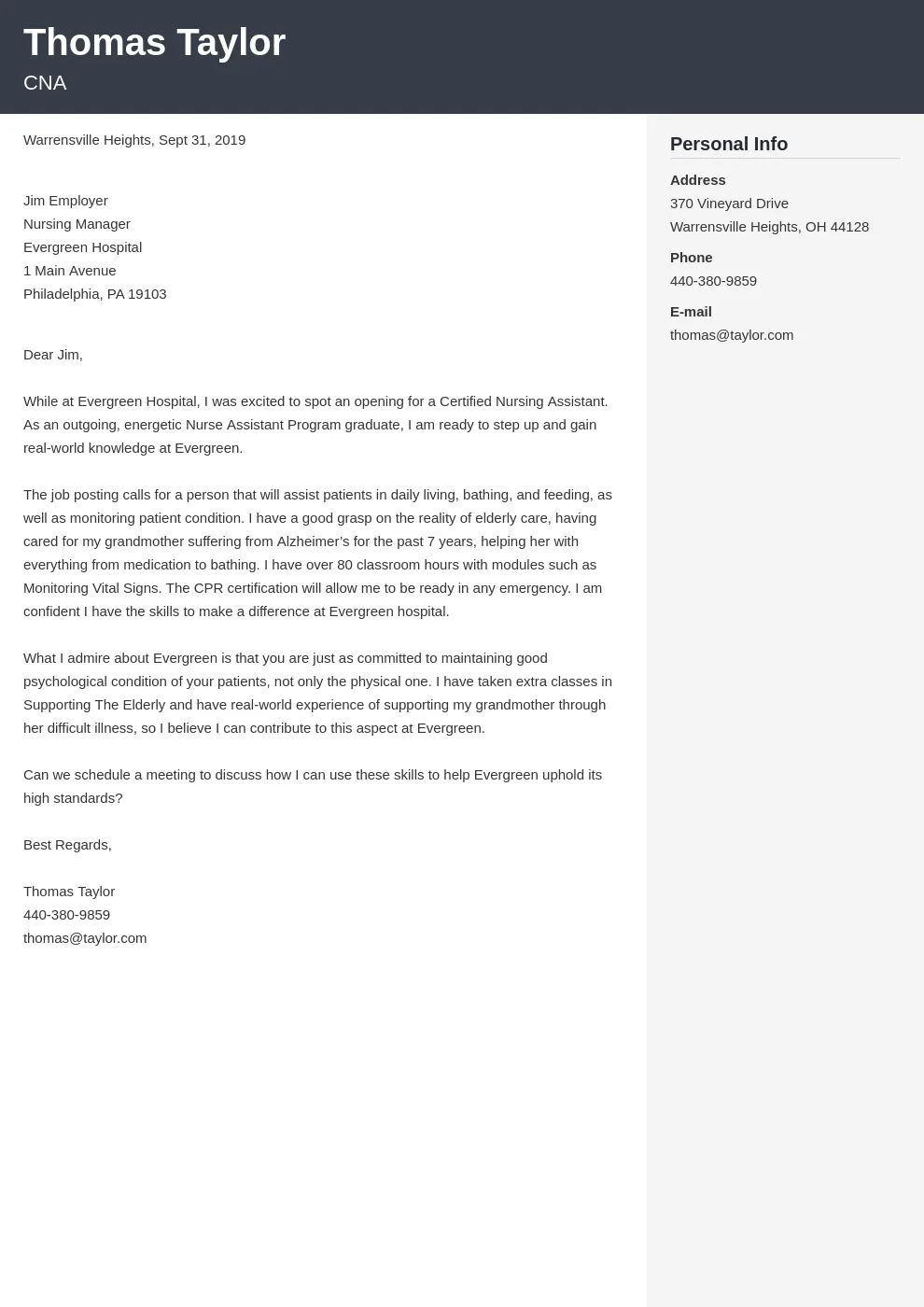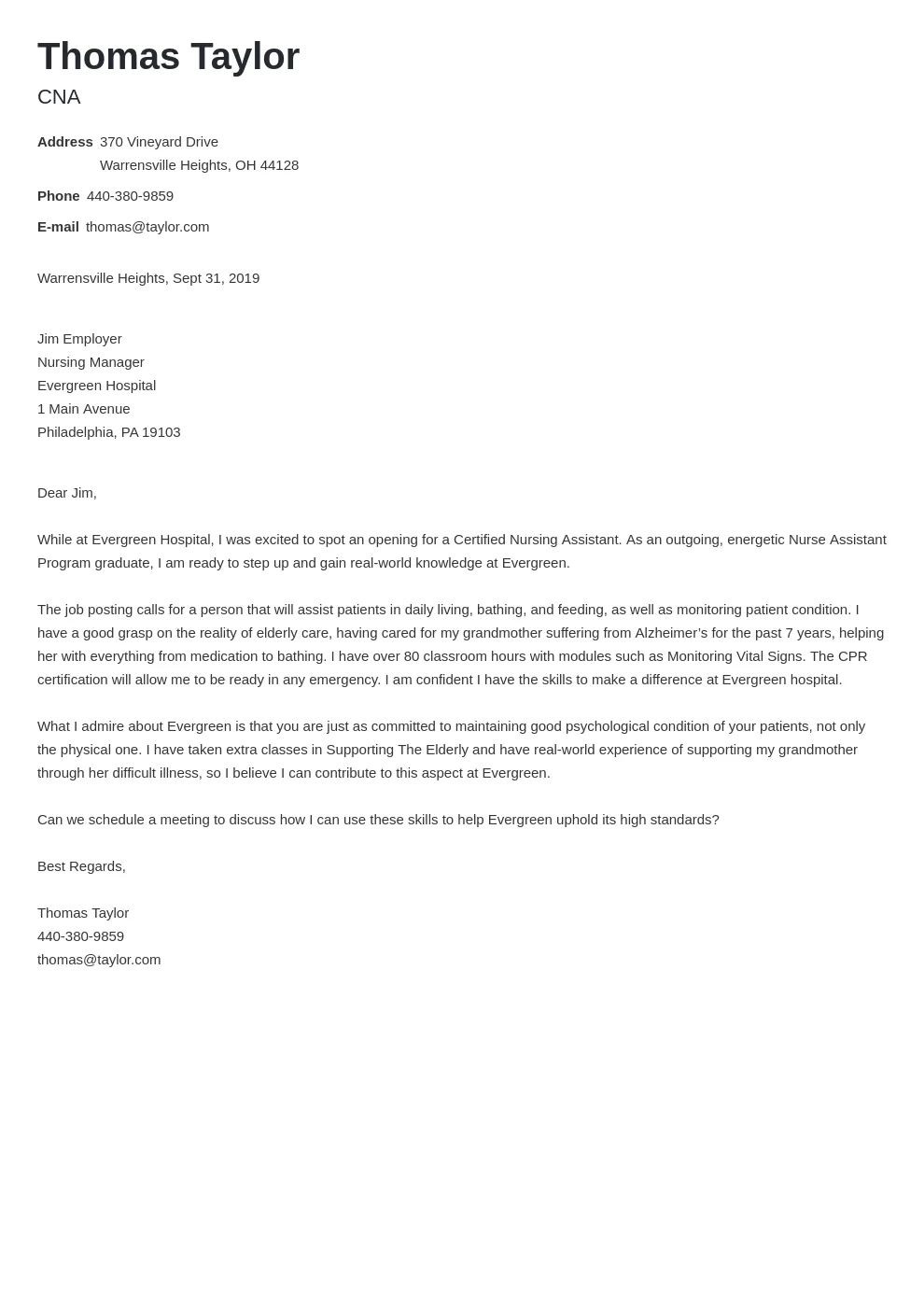Crafting a CNA Cover Letter
A well-crafted Certified Nursing Assistant (CNA) cover letter is your first chance to make a strong impression on a potential employer. It serves as a crucial introduction, allowing you to showcase your skills, experience, and passion for providing care to patients. Your cover letter is more than just a formality; it’s an opportunity to highlight why you’re the ideal candidate for the position. Begin by addressing the hiring manager by name if possible, which shows you’ve taken the time to research the facility and the specific role you’re applying for. Avoid generic salutations like ‘To Whom It May Concern.’ In the opening paragraph, clearly state the position you’re applying for and where you saw the job posting. Briefly mention your key qualifications and express your enthusiasm for the opportunity. This immediate engagement will grab the reader’s attention and encourage them to delve deeper into your application.
Researching the Facility
Before you begin writing, conduct thorough research on the healthcare facility or organization you’re applying to. Understanding their mission, values, and the specific needs of their patient population will help you tailor your cover letter to their requirements. Visit their website, read online reviews, and if possible, speak with current employees or former patients to gain insights into the facility’s culture and work environment. This research allows you to demonstrate your genuine interest in the position and your commitment to aligning your skills and experience with the facility’s objectives. For example, if the facility specializes in geriatric care, emphasize any relevant experience or training you have in that area. If they emphasize patient-centered care, highlight your compassion and ability to build strong relationships with patients and their families. By showing that you understand the facility’s unique characteristics, you significantly increase your chances of capturing the hiring manager’s attention.
Highlighting Relevant Skills and Experience

In the body of your cover letter, focus on highlighting the skills and experience that directly align with the job requirements. Review the job description carefully and identify the key qualifications the employer is seeking. Then, provide specific examples of how you’ve demonstrated those skills in previous roles. Instead of simply listing your responsibilities, use the STAR method (Situation, Task, Action, Result) to provide context and illustrate your accomplishments. For instance, describe a situation where you had to provide care to a patient with specific needs, the task you were assigned, the actions you took to address the patient’s needs, and the positive results you achieved. This approach allows the hiring manager to clearly understand your capabilities and how you can contribute to their team. Include quantifiable achievements whenever possible, such as the number of patients you’ve cared for, the positive outcomes you’ve helped achieve, or any improvements you’ve made in patient care processes.
Showcasing Compassion and Empathy
As a CNA, compassion and empathy are paramount. Your cover letter should reflect your ability to connect with patients on an emotional level and provide them with comfort and support. Share examples of how you’ve demonstrated these qualities in your previous roles. Describe instances where you went above and beyond to meet a patient’s needs, alleviate their fears, or simply provide a listening ear. Consider including a brief anecdote that illustrates your ability to empathize with patients and their families. This might involve a time when you helped a patient cope with a difficult situation, provided emotional support to a grieving family member, or showed exceptional patience and understanding in a challenging circumstance. The goal is to convey your genuine passion for caring for others and your commitment to providing high-quality, compassionate care. Emphasize your ability to build trust and rapport with patients, as well as your ability to create a positive and supportive environment.
Demonstrating Communication and Interpersonal Abilities
Effective communication and strong interpersonal skills are crucial for CNAs. In your cover letter, highlight your ability to communicate clearly and effectively with patients, their families, and other healthcare professionals. Provide examples of how you’ve successfully communicated complex medical information, resolved conflicts, and built positive working relationships. Mention your experience with different communication styles and your ability to adapt your approach to meet the needs of diverse patients. Also, touch on your teamwork abilities, demonstrating your capacity to collaborate effectively with nurses, doctors, and other team members. Share instances where you’ve worked collaboratively to improve patient outcomes, solve problems, or enhance the overall quality of care. By showcasing your strong communication and interpersonal skills, you assure the hiring manager that you possess the necessary qualities to thrive in a collaborative healthcare environment and provide the best possible care to patients.
Tailoring the Letter to the Job Description

One of the most impactful ways to impress a hiring manager is by tailoring your cover letter to the specific job description. This shows that you’ve carefully reviewed the requirements and are genuinely interested in the position. Use keywords and phrases from the job description throughout your letter to demonstrate that you meet their needs and expectations. Don’t simply restate the job description; instead, use it as a guide to highlight your relevant skills and experience. For instance, if the job description emphasizes experience with a particular patient population, focus on your relevant experience in that area. If it mentions specific skills or certifications, be sure to mention them in your letter. By customizing your cover letter, you prove that you’re not just sending a generic application, but that you’re a well-suited candidate who’s invested in the role and the facility. This personalized approach greatly increases the chances of your application being noticed and considered.
Formatting the CNA Cover Letter
The format of your CNA cover letter should be professional and easy to read. Choose a clean, readable font like Arial or Times New Roman, and use a font size between 10 and 12 points. Use standard business letter formatting, including your contact information, the date, the hiring manager’s name and title (if known), and the facility’s address. Keep the letter concise, typically no more than one page. Break up the text with paragraphs, and use bullet points to highlight key skills and experiences. Ensure your cover letter has consistent margins and spacing. Avoid any grammatical errors or typos. A well-formatted cover letter is not only visually appealing but also shows attention to detail, which is critical in healthcare. Use clear headings to organize your content, making it easy for the hiring manager to scan and find the information they need. Proofread your letter carefully before submitting to ensure it looks its best.
Proofreading and Editing Your Cover Letter
Before submitting your cover letter, meticulously proofread and edit it to eliminate any errors. Typos, grammatical mistakes, and poor sentence structure can undermine your professionalism and credibility. Read your letter aloud to catch any awkward phrasing or unclear sentences. Ask a friend, family member, or career counselor to review your letter for feedback. They can identify areas where you might need to clarify your points or strengthen your language. Check for any inconsistencies in your formatting, such as different font sizes or spacing. Ensure that all your contact information is accurate. Use spell-check and grammar-check tools, but don’t rely solely on them; these tools don’t always catch all errors. A well-proofread and edited cover letter demonstrates your attention to detail and your commitment to presenting yourself in the best possible light. It shows the hiring manager that you take your application seriously and are capable of producing high-quality work.
Including a Strong Call to Action

Conclude your cover letter with a strong call to action. Express your interest in an interview and your availability for a follow-up conversation. Thank the hiring manager for their time and consideration. Provide your contact information again, making it easy for them to reach you. Keep your call to action direct and professional. For example, you could say, ‘I am eager to discuss my qualifications further and am available for an interview at your earliest convenience. Thank you for considering my application. I can be reached at [your phone number] or [your email address].’ A strong call to action motivates the hiring manager to move forward with your application. It shows your enthusiasm for the position and makes it clear that you’re ready to take the next step in the hiring process. Including a call to action increases your chances of getting an interview and ultimately landing the job.
Follow-Up After Submission
After submitting your cover letter and resume, follow up with the hiring manager or the facility’s human resources department. Within a week of submitting your application, send a brief email or make a phone call to express your continued interest in the position. Thank the hiring manager for their time and reiterate your qualifications. If you have any new information or updates since submitting your application, include them in your follow-up. If you haven’t heard back within a reasonable timeframe, don’t hesitate to follow up again. This shows your proactive approach and your genuine interest in the opportunity. However, be mindful of being too persistent, as excessive follow-up can be counterproductive. The follow-up is a great way to solidify your interest and ensure your application remains at the forefront of the hiring manager’s mind. It also demonstrates your professional and enthusiastic approach to pursuing career opportunities as a CNA.
